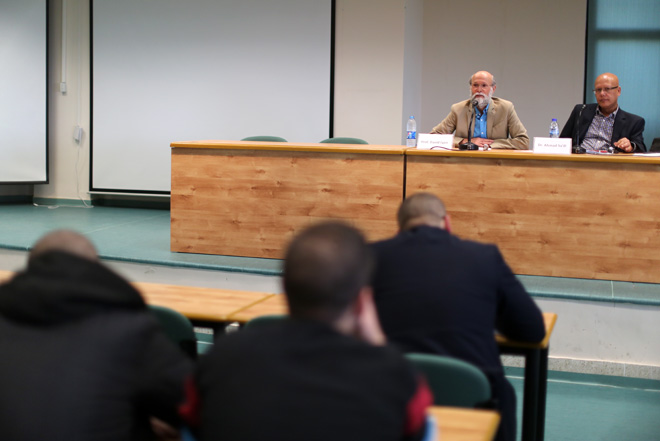Birzeit School of Government Enters the Stage with Lyons Lecture Series on Surveillance
The newly-established Birzeit School of Government at the Faculty of Law and Public Administration inaugurated its first public activity on March 3, 2015 by hosting international scholar and expert David Lyon to lecture on trends in surveillance by government and business.
Professor Lyon examined the current trends visible in today's ever-expanding surveillance networks, showing the many ways that the processing of personal data affect our life chances and choices, directly and indirectly, and suggesting some priorities for citizens wanting to challenge surveillance today. He asserted that surveillance is neither inevitable nor irreversible - it can be used for care as well as control and to protect as well as to deny rights.
The lecture was one in a three-part series entitled "Surveillance: An ancient practice with modern means" and was followed by two additional public lectures by Professor Lyon on March 10 and 17 entitled “Surveillance Rights and Wrongs: Ethics, civil liberties, human dignity” and “Surveillance in Colonial Contexts: How power is maintained by managing visibility,” respectively.The lecture series fits the faculty’s objectives of providing public institutions with specialized skills and knowledge, imparting cutting-edge expertise in order to supply society with qualified candidates, and providing needed theoretical and technical advice.
The school’s inaugural lecture was chaired by its director, Husam Zomlot. He said that the School of Government is Birzeit University's contribution to the public sphere and was established with the aim of translating academic knowledge to policy insights and debate in order to affect decision-making processes at all levels. Through various programs of excellence, the school will build the capacity of students and practitioners to lead in public, private and civil society institutions and apply evidence-based tools and best practice to contemporary problems in the Palestinian and Arab public sectors.
The school strives to become the center of policy debate and development in Palestine and beyond by focusing on four pillars: academic programs in public policy and local government, short- and long-term executive education that fits the demands and needs of the public sector, civil society and business; policy-oriented research; and offering a platform for public events. In addition, the school organizes forums for debate and the sharing of expertise and experiences. Zomlot concluded saying that the school is destined to become Palestine's greenhouse of leadership in the public sector, and the hub for national and international strategic thinking and policy deliberations.
This activity is funded by the European Union, as part of the project “Developing a Master’s Program in Criminal Law,” being implemented by An-Najah National University, Al-Quds University and Birzeit University.







